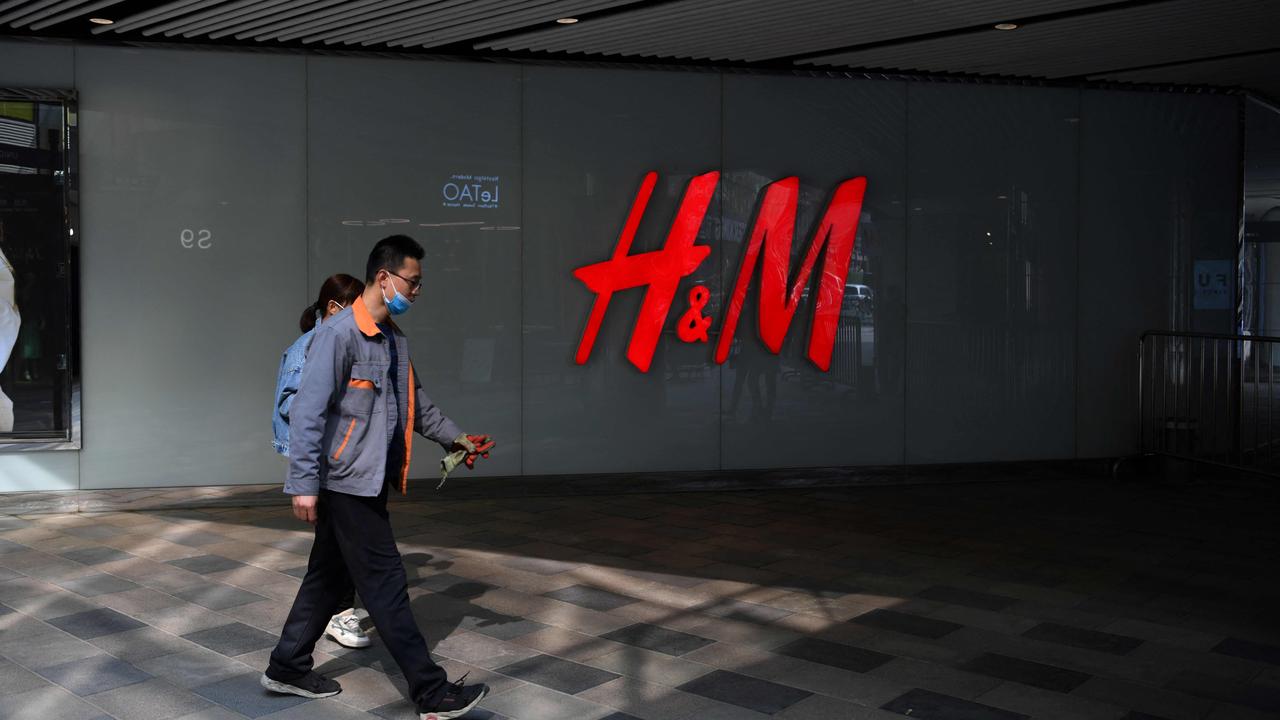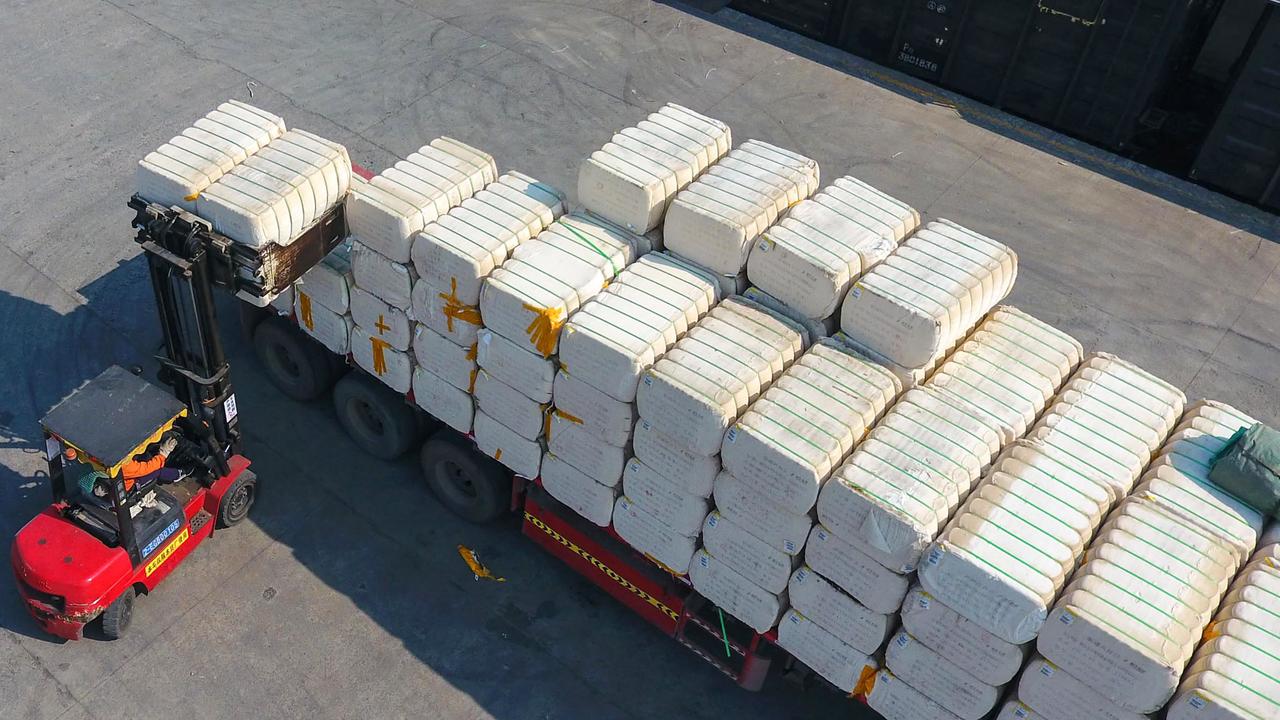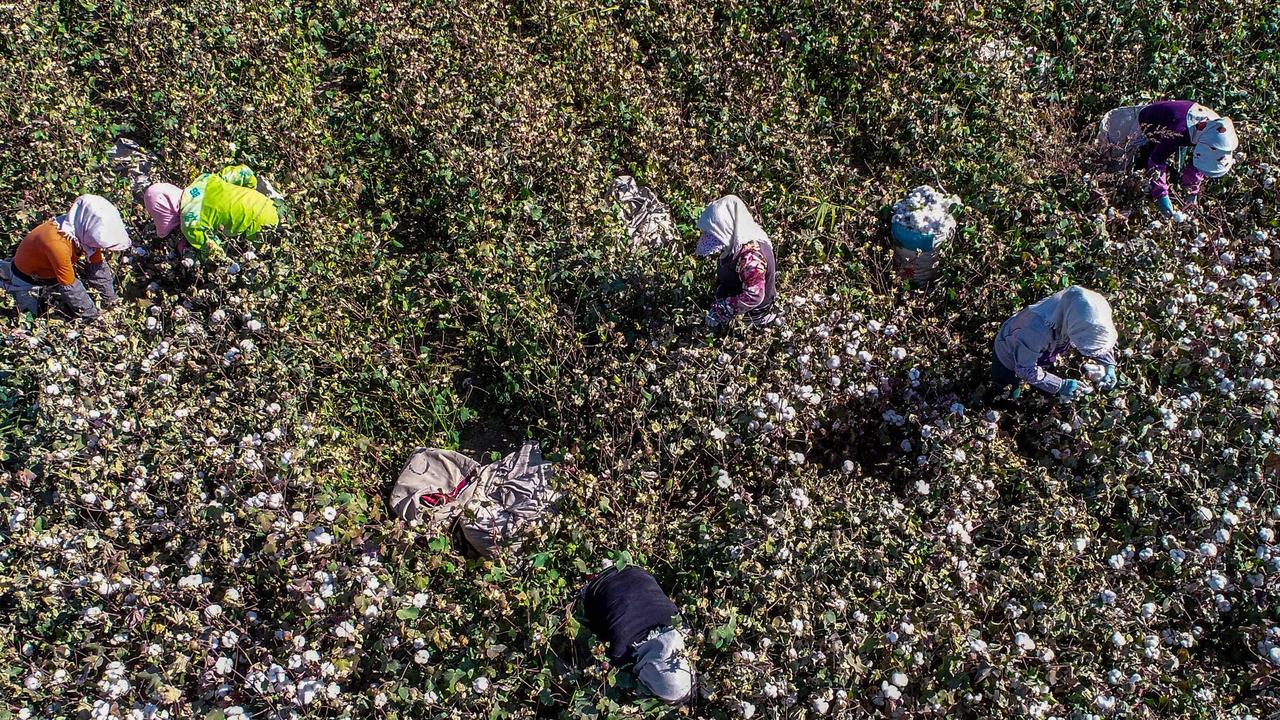Western brands including H&M and Nike face growing Chinese backlash over Xinjiang cotton stance
As tensions with the west escalate, China is flexing its economic muscle by taking aim at major brands including H&M, Nike and Adidas.

Major brands including H&M and Nike have been sucked into a deepening international dispute between China and the west over alleged human rights abuses against the Uighur ethnic minority in Xinjiang.
At the centre of the latest battle – a nationalistic fervour over Xinjiang cotton, whipped up by the Chinese government and eagerly embraced by consumers, celebrities, tech companies and even rappers.
“The ugly face of the western colonists is recorded on the snowy white cotton,” read the lyrics to a rap song posted online by Chinese state media.
The song, which slams “western forces slandering Xinjiang cotton”, comes amid a social media storm in China that has seen the hashtag “I Support Xinjiang Cotton” viewed more than six billion times, according to Manya Koetse, editor-in-chief of the website What’s On Weibo.
Chinese state media are now posting this rap song on social media about the "Western forces slandering Xinjiang cotton." pic.twitter.com/piouahMf80
— Manya Koetse (@manyapan) March 27, 2021
From Weixin: Nothing shows disdain for concerns about forced labour like burning your shoes pic.twitter.com/mwxduRlQ9B
— Bill Birtles (@billbirtles) March 25, 2021
On Monday, China warned H&M and other western companies that the “era of bullying” by foreign powers is over, with Xinjiang government spokesman Xu Guixiang saying companies wielding the “big stick of sanctions” against the northerwestern region would only hurt themselves.
“China is no longer the China of 1840, and the era when Chinese people suffered from great power hegemony, and bullying will never return again,” he said at a press conference with China’s Foreign Ministry on Monday, the South China Morning Post reported.
“We hope that businesses like H&M will be more clear-eyed and distinguish right from wrong.”
Brands pulled into cotton battle
An estimated one million Uighurs and other largely Muslim ethnic minorities are reportedly being held in a vast network of camps in Xinjiang.
Roughly 22 per cent of the world’s cotton comes from China, 84 per cent of which is sourced from Xinjiang, according to the US-based Centre for Strategic and International Studies.
Human rights groups have accused Chinese authorities of human rights abuses against the local population including torture, systematic rape, sterilisations and forced labour.
But as the US and other western countries engage in an escalating series of tit-for-tat sanctions, China has seized on the Xinjiang cotton issue as an economic battering ram.
The US, the European Union, Canada and the UK last week announced co-ordinated sanctions against current and former Chinese officials over human rights abuses against the Uighur minority, prompting Beijing to respond with retaliatory sanctions.
At the same time, western multinationals including Sweden’s H&M, America’s Nike, Germany’s Adidas and Japan’s Uniqlo came under co-ordinated attack after past statements that they would not use Xinjiang cotton over concerns of alleged forced labour were resurfaced on Twitter-like social network Weibo.
At the urging of Chinese state media, nationalistic internet users have vowed to boycott major western brands.
Chinese celebrities and tech firms have already waded in, pulling out of partnerships with Nike, H&M, Adidas, Burberry, Lacoste and Calvin Klein.
In one video posted on WeChat, a man burned a pair of Nike shoes on his balcony.
In another video, a Chinese policeman named and shamed brands that had signed up to the Better Cotton Initiative – a Swiss-based not-for-profit founded in 2005 to promote better standards in the industry.

H&M erased from the internet
In the most extreme example, H&M was all but erased from the internet in China, with its products pulled from major platforms including Alibaba and JD.com.
H&M’s smartphone app was removed from app stores, its roughly 500 stores were airbrushed from online maps operated by Alibaba and Baidu, and were no longer available as destinations on ride-sharing service Didi Chuxing.
According to Bloomberg, landlords in several Chinese cities have shuttered at least six H&M outlets.
Amid the digital erasure, H&M China said on Wednesday it “does not represent any political position” and remained committed to long-term investment in China.
Separately, WeChat owner Tencent announced it was removing Burberry-designed costumes from a popular mobile phone game, the Associated Press reported.
The resurfacing of the pledges was denounced on Friday by the US, which implied it was a calculated move by Beijing.
“The US condemns (China’s) social media campaign and corporate and consumer boycott against companies, including American, European and Japanese businesses,” State Department deputy spokeswoman Jalina Porter said.
“We commend and stand with companies that adhere to the US laws, and ensure products we’re consuming are not made with forced labour.”
At a press conference on Monday, Chinese Foreign Ministry Spokesman Zhao Lijian rejected claims the boycott was “state-led”.
“Some accuse the Chinese government of fanning nationalism and calling for a boycott,” he said.
“Certain foreign brands refuse to use Xinjiang cotton based merely on lies. This negative act itself is more than enough to trigger opposition and indignation among the public. There is no need whatsoever for any ‘state-led’ campaign. The smears and rumours inspire patriotism better than anything.”
Chinese pressure forces backflips
The latest stoush has been marked by conflicting statements by Chinese-based arms of some groups, while others have outright recanted under pressure.
The Better Cotton Initiative last year said it had concluded there was a risk of forced labour in Xinjiang, and that it was pulling out of the region.
But two statements to that effect, issued in October and December, have since been deleted from the group’s website.
Last week, the head of the Better Cotton Initiative’s Shanghai branch publicly split with its headquarters in Geneva. In claims heavily promoted by Chinese state media, Wu Yan said BCI had “repeatedly conducted stringent inspections” and that “we haven’t identified one single case of forced labour”.
The group has not addressed the contradictory positions, with a London-based spokesman saying only that it had a “constructive dialogue” with stakeholders in China.
“BCI is committed to promoting sustainable agriculture everywhere cotton is grown, including in China,” he told the South China Morning Post.
Meanwhile, the Weibo account for German clothing brand Hugo Boss last week vowed to continue to “purchase and support” Xinjiang cotton, despite the company having previously denied ever using it.
The company later told the Hong Kong Free Press that the statement was “unauthorised”.
And in the UK, among the entities hit by Beijing’s sanctions was Essex Court Chambers, a law firm consisting of more than 90 leading barristers.
In February, four of its barristers – acting on behalf of their clients, the Global Legal Action Network – released a legal opinion concluding there was a “credible case” that the Chinese government’s actions against the Uighur population in Xinjiang amounted to “crimes against humanity and the crime of genocide”.
Essex Court Chambers has since removed the legal opinion from its website and attempted to distance itself from the controversy.
“No other member of Essex Court Chambers was involved in or responsible for the advice and analysis contained in the Legal Opinion or its publication,” it said in a statement.

‘Beijing can’t control rising backlash’
Michael Shoebridge, director of defence, strategy and national security at the Australian Strategic Policy Insitute, believes the Chinese government may have miscalculated.
“Their assessment (is) that big companies need the Chinese market so much that they will sacrifice other markets and also ethical positions to keep (it),” he told news.com.au.
H&M is being used as a “test case” for this – a large number of its customers outside of China don’t want to wear products made with forced labour, but China has issued an ultimatum that if companies don’t use Xinjiang cotton, they will be forced out of the country.
“So there’s no way for a company to please both,” Mr Shoebridge said.
“The Chinese calculation, which is the same they’ve used for their citizens in Hong Kong, is that people’s greatest priority is on the financial aspects. Companies will place such a premium on maintaining access to the China market that they will be silent on these issues.”
But Mr Shoebridge argues that the problem for China is consumers in western countries, as well as China’s Asian neighbours like Japan and South Korea, don’t require government prodding.
“The Chinese government is stoking its population’s consumer concerns, telling them they need to be outraged,” he said.
“Other governments have a different situation. Their populations, that are the customer base of these big global companies, are more activists by themselves without prodding by their governments. The rise of customer groups who want to force political and corporate change is a phenomenon (across the west), Japan, South Korea, Australia.”
He noted there was “even a rising consumer backlash in India against Chinese tech products and apps”.
“It’s actually a harder situation Beijing isn’t in control of,” he said.
China mocks Biden administration
Nevertheless, China’s actions suggest it believes it is on the front foot.
Last month, senior Biden administration officials at a summit in Alaska appeared unprepared for a shellacking by Chinese diplomat Yang Jiechi.
After sitting through an airing of US grievances in front of international media, a furious Mr Yang fired back, publicly lecturing Secretary of State Tony Blinken and White House national security adviser Jake Sullivan over America’s own human rights track record.
The senior Chinese Communist Party member mocked the Biden officials, ominously warning that they were under the mistaken belief that they were operating from a “position of strength”.
“The United States does not have the qualification to say that it wants to speak to China from a position of strength,” he said, invoking the Black Lives Matter movement as an example of internal division.
“We hope that the United States will do better on human rights. China has made steady progress in human rights. And the fact is that there are many problems within the United States regarding human rights, which is admitted by the US itself.”
After the extraordinary and unexpected tongue-lashing, President Joe Biden said he was “proud” of Mr Blinken’s performance.
“I’m very proud of the Secretary of State,” Mr Biden told reporters on the White House lawn the following day.
– with AFP




